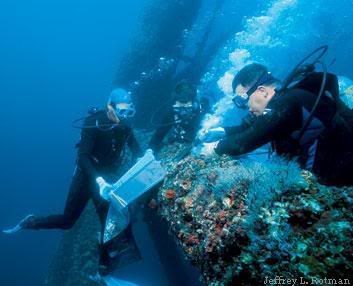
"A compound produced by a simple soil microbe may prove a new and extremely effective antibiotic. In recent decades, strains of Staphylococcus aureus and various Enterococcus bacteria have shown resistance to the most powerful antibiotics in the modern medical arsenal. The new compound has wiped out the two superbugs in vitro and in mice.
...
"The path ahead remains a long one that includes further preclinical study, and, if these studies are successful, extensive clinical trials for safety and efficacy in humans," writes Eric Brown of McMaster University in Ontario in a commentary accompanying the piece in today's Nature. If it passes all of those tests, platensimycin could be the third new antibiotic--and the strongest--to reach patients in the last 40 years."
This is amazing news for medicine and potentially human health. According to the
FDA:
Disease-causing microbes that have become resistant to drug therapy are an increasing public health problem. Tuberculosis, gonorrhea, malaria, and childhood ear infections are just a few of the diseases that have become hard to treat with antibiotic drugs.
Though food-producing animals are given antibiotic drugs for important therapeutic, disease prevention or production reasons, these drugs can cause microbes to become resistant to drugs used to treat human illness, ultimately making some human sicknesses harder to treat.
About 70 percent of bacteria that cause infections in hospitals are resistant to at least one of the drugs most commonly used to treat infections."
And according to the
NIH:
Nearly 2 million patients in the United States get an infection in the hospital each year
About 90,000 of those patients die each year as a result of their infection, up from 13,300 patient deaths in 1992
More than 70 percent of the bacteria that cause hospital-acquired infections are resistant to at least one of the antibiotics most commonly used to treat them
People infected with antibiotic-resistant organisms are more likely to have longer hospital stays and require treatment with second- or third-choice medicines that may be less effective, more toxic, and more expensive"
A decrease in the over use of anitbiotics is definitely called for, but new medicines are still needed to combat the resistant monsters our over use has created.

I've always been interested in the work that biologists, botanists, microbiologists, and chemists have done in combing our terrestial lands looking for unknown compounds occuring in our environment that can combat our illnesses. Why go through the work of creating a synthetic chemical compound when a naturally occuring one might already exist? One of
thee most interesting articles I've read on the subject was from the May 2004 issue of the Smithsonian titled
Medicine from the Sea: "
From slime to sponges, scientists are plumbing the ocean's depths for new medications to treat cancer, pain and other ailments." What a job. Hopefully my career path will take me there one day.

 I've always been interested in the work that biologists, botanists, microbiologists, and chemists have done in combing our terrestial lands looking for unknown compounds occuring in our environment that can combat our illnesses. Why go through the work of creating a synthetic chemical compound when a naturally occuring one might already exist? One of thee most interesting articles I've read on the subject was from the May 2004 issue of the Smithsonian titled Medicine from the Sea: "From slime to sponges, scientists are plumbing the ocean's depths for new medications to treat cancer, pain and other ailments." What a job. Hopefully my career path will take me there one day.
I've always been interested in the work that biologists, botanists, microbiologists, and chemists have done in combing our terrestial lands looking for unknown compounds occuring in our environment that can combat our illnesses. Why go through the work of creating a synthetic chemical compound when a naturally occuring one might already exist? One of thee most interesting articles I've read on the subject was from the May 2004 issue of the Smithsonian titled Medicine from the Sea: "From slime to sponges, scientists are plumbing the ocean's depths for new medications to treat cancer, pain and other ailments." What a job. Hopefully my career path will take me there one day.


0 Comments:
Post a Comment
<< Home